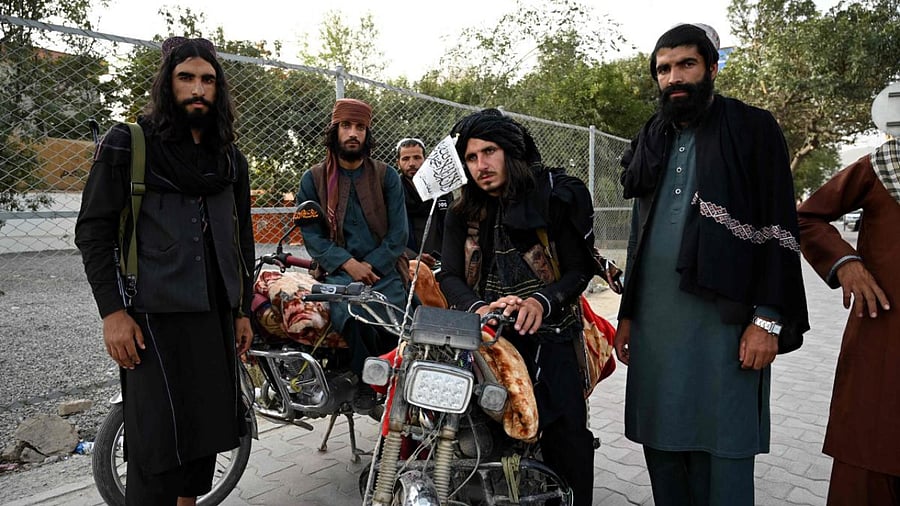
For the past three days, since August 15, the world's attention is riveted on the developments unfolding in Afghanistan. The scorching pace of events left the world community of strategic analysts caught in a breathless cycle attempting to interpret the emerging scenario as most of them read the tea leaves wrong.
The world is still soaking in the unedifying spectacle of swarms of people scurrying across Hamid Karzai airport in Kabul to save lives amid fears of impending enforcement of strict Sharia laws by the Taliban, especially against the rights of women and girl children. The US and countries in Europe promised to evacuate Afghans who assisted the ISAF in Afghanistan.
On its part, the Taliban came out in the public offering its vision of governance, portraying its 2.0 version that will be more accommodative, respect boundaries, not offer its soil to launch militant activities against another country while quietly reminding women in the country will be accorded respect in tune with what Sharia permits.
These are early days for the world to come to any conclusion on the nature of policies that the Taliban, which seeks to establish the Islamic Emirate in the war-torn country, would pursue conforming to the contours drawn at the first-ever press conference on Tuesday.
Reams have been written, and thousands of words spoken attempting to decode the capitulation of the Ashraf Ghani government and the surrender of the Afghan National Army as the Taliban arrived at the gates of Kabul.
The new narrative ranges from charges of an intelligence failure in estimating the resistance capacity of the nearly three-lakh Afghan forces trained and equipped by the United States, the world's most powerful military, to a major miscalculation by the American President Joe Biden.
Yet, the harsh truth is the exit of the United States and its NATO forces from Afghanistan is a done deal. The Taliban is set to take over the reins of governance amid a signal shout from a section led by Amrullah Saleh, the first vice president under former President Ghani, offering resistance. Is there the possibility of a civil war?
Today's landscape is different from when the Northern Alliance of Ahmed Shah Masood put up resistance during the 1996-2001 phase of the Taliban in control of the war-torn country. The ground situation has altered rapidly over the past few months as the Taliban advanced to capture provinces even as the Americans began pulling out troops from the country.
The vacuum created by reduced strategic space for the United States and the loss of its leverage with the Taliban is now being filled by China and Russia. Pakistan finds itself in another unique position as the pieces of the geopolitical chessboard are rearranged with Iran, too, making its presence felt.
China stays invested in Afghanistan under both the Belt and Road Initiative projects and mining for rare materials. Besides commercial engagement, Beijing also seeks the Taliban's assistance to break its ties with the East Turkistan Islamic Movement, the Uyghur Muslim militant group from Xinjiang province in China. Russia today can find solace that the mighty Americans beat an inglorious retreat than it did in the "Graveyard of Empires" in the mid-1990s.
India now finds itself in a different position. Having invested in building upon the reservoir of goodwill among the people of Afghanistan, New Delhi spent US$ 3 billion in infrastructure projects, education, drinking water and health sectors. It now awaits the policies when a new regime takes over governance in Kabul.
The scars of the 1999 hijack of an Indian Airlines plane are a grim reminder of the difficult times. The aircraft parked at Kandhar under the watch of the Taliban and the ignominy of trading three prisoners incarcerated in Indian jails for terror acts in exchange for passengers' safety continues to haunt.
The transition of power in Afghanistan will bring about a significant change in the regional security situation. Kabul is part of the extended neighbourhood and shares borders with Pakistan, whose proximity with the Taliban and patronage by the Pakistan Army is well known.
As the world was preparing for a change of guard, there were reports that New Delhi opened communication channels with the Taliban, though there was no official confirmation. Yet, in a recent interview with a news magazine, a spokesman for the Taliban took a dim view of support in the form of military assistance extended by New Delhi to Kabul, which was deployed against it.
In such a scenario, the options before India remain limited. Besides the wait and watch approach, New Delhi should explore alternate channels to reach out to a new dispensation that would assume governance. It is here that traditional friendly ties with countries like Russia and Iran should provide a pathway.
The manner in which the Taliban came out to announce its approach is an indicator that its leaders are more sensitive to changed realities. The declarations made on Tuesday were politically correct. The Taliban may now want greater acceptance, unlike two decades ago when only a few countries like Pakistan, Saudi Arabia, and the UAE recognised it.
While quiet diplomacy should be efficacious, the evolving situation will be the one on which security planners will keep a close watch. Reports that militants from the Lashkar-e-Taiba and Jaish-e-Mohammed are reaching and mingling with the Taliban underlines the possibility of blowback in Jammu and Kashmir. This accentuates when Pakistan's ISI plays a role in drafting such elements to create trouble in India. The guardrails need to be fortified.
(The writer is a Delhi-based journalist)